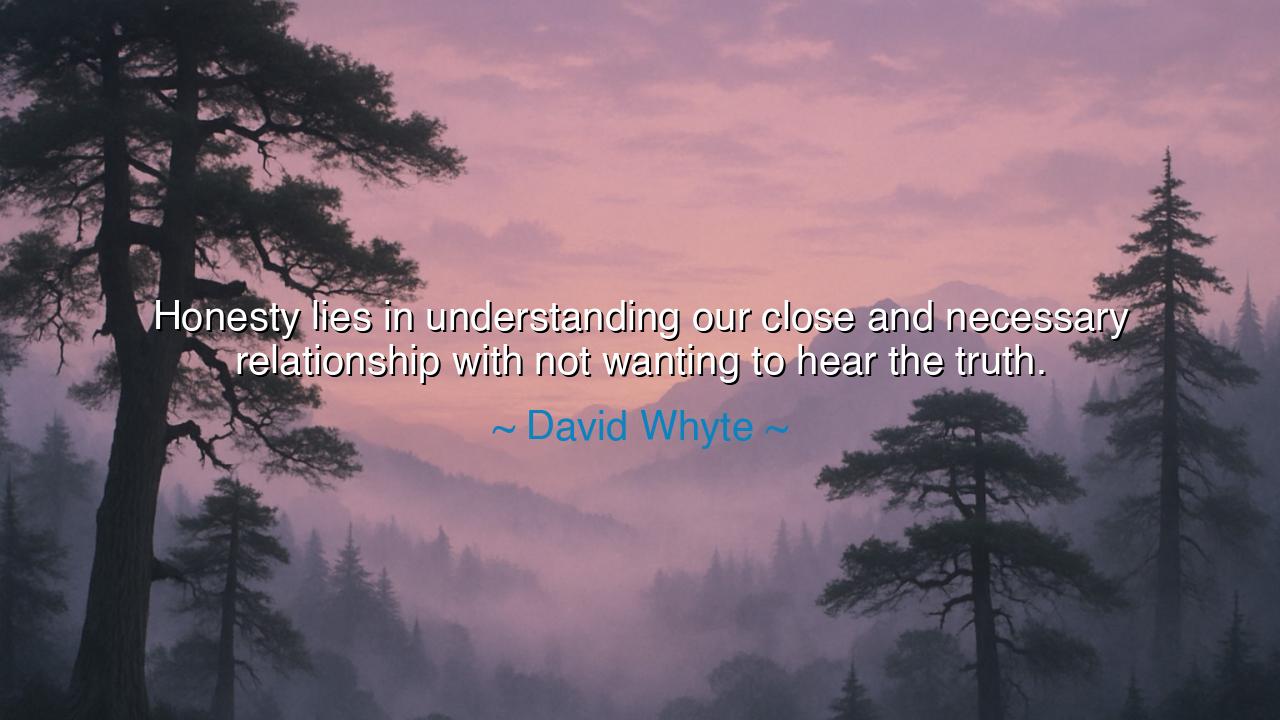
Honesty lies in understanding our close and necessary
Honesty lies in understanding our close and necessary relationship with not wanting to hear the truth.






Hearken, O children of the ages, to the words of David Whyte, who speaks with the voice of reflection and insight: “Honesty lies in understanding our close and necessary relationship with not wanting to hear the truth.” Herein lies the eternal teaching that the path of self-awareness is never simple, and that the heart often recoils from what it most needs to know. To confront the truth is to meet the self in its entirety, yet the human spirit is drawn to avoidance, denial, and the comforting illusions that veil reality.
In the chronicles of old, the elders observed that the pursuit of wisdom demands courage, for the truth is both liberating and daunting. The soul’s encounter with reality reveals strengths and flaws alike, and to deny or flee from it is natural. Whyte reminds us that honesty is not merely speaking or hearing truth, but recognizing the tension within—the necessary reluctance that coexists with the desire to understand and grow. This intimate relationship between denial and acceptance is the crucible in which self-knowledge is forged.
The origin of this wisdom is ancient, found in the teachings of sages, mystics, and philosophers who spoke of the inner struggle as sacred. Across monasteries, councils, and sacred groves, it was known that the human heart is both seeker and evader. To approach truth with awareness of one’s own resistance is the beginning of genuine honesty, a practice that shapes character, fosters growth, and opens the spirit to clarity beyond fear.
O seekers, understand that the path of honesty requires both courage and patience. To recognize the relationship with what we do not wish to hear is to step into the arena of the self, where illusions are challenged and wisdom is earned. It is through this acknowledgment of inner tension that the spirit matures, learning to hold discomfort and revelation in equal measure, and to transform resistance into insight.
Let this teaching endure, children of the future: honesty is not simple acquiescence to facts, but the deep, ongoing recognition of our own evasions. To know the truth is to confront the self with all its complexity, yet in this confrontation lies freedom, growth, and the illumination of life. The human heart, though reluctant, is refined in this sacred dance between desire and avoidance.
In this eternal truth, the mortal learns that wisdom is born from the courage to see oneself fully. Embrace the necessary relationship with the truths you resist, for it is through this embrace that honesty becomes not a burden, but a gateway to clarity, purpose, and the enduring strength of the spirit.
If you wish, I can also craft a more poetic, ceremonial version, where honesty and the relationship with reluctant truth are depicted as a sacred rite of the soul. Would you like me to do that?






VNVu Nguyen
This quote challenges the conventional idea of honesty as something clear-cut and straightforward. Maybe honesty isn't just about telling the truth, but understanding our resistance to it. What if the first step towards honesty is recognizing that we have an instinct to reject the truth, and accepting that instinct? Could this awareness make it easier to hear difficult truths, or is it simply part of the human condition?
TLMinh Thanh Le
Whyte’s words resonate with the human tendency to avoid uncomfortable truths. But does this mean that we’re not honest with ourselves? Is honesty about simply acknowledging our avoidance of the truth? It makes me wonder—if we can admit to avoiding truth, does that already begin the process of being honest with ourselves? How can we break this cycle of avoidance to truly embrace what we know is true?
HHDuy Hoa Huynh
I find this quote interesting because it taps into the idea that truth can be more difficult to hear than to say. We may be open to speaking the truth, but when it’s directed at us, it feels more challenging. Why do we resist hearing the truth when we know it could lead to growth or improvement? Is it possible that the truth itself is less painful than the fear of it?
NNNguyen Ninh
This quote really struck me because it highlights the paradox we often face. We want honesty, but we also fear the consequences of the truth. How many times have we ignored what we know deep down is true? How can we reconcile our desire for truth with the discomfort it sometimes brings? Maybe the real honesty lies in acknowledging this inner conflict and learning to navigate it.
NQPham Nhu Quynh
David Whyte’s quote made me reflect on the complexity of honesty. It’s true that sometimes we avoid hearing the truth because it feels uncomfortable or threatening. But why do we have such a strong resistance to it? Could it be that facing the truth requires a vulnerability that many of us are unwilling to embrace? How do we find the courage to listen, even when the truth stings?